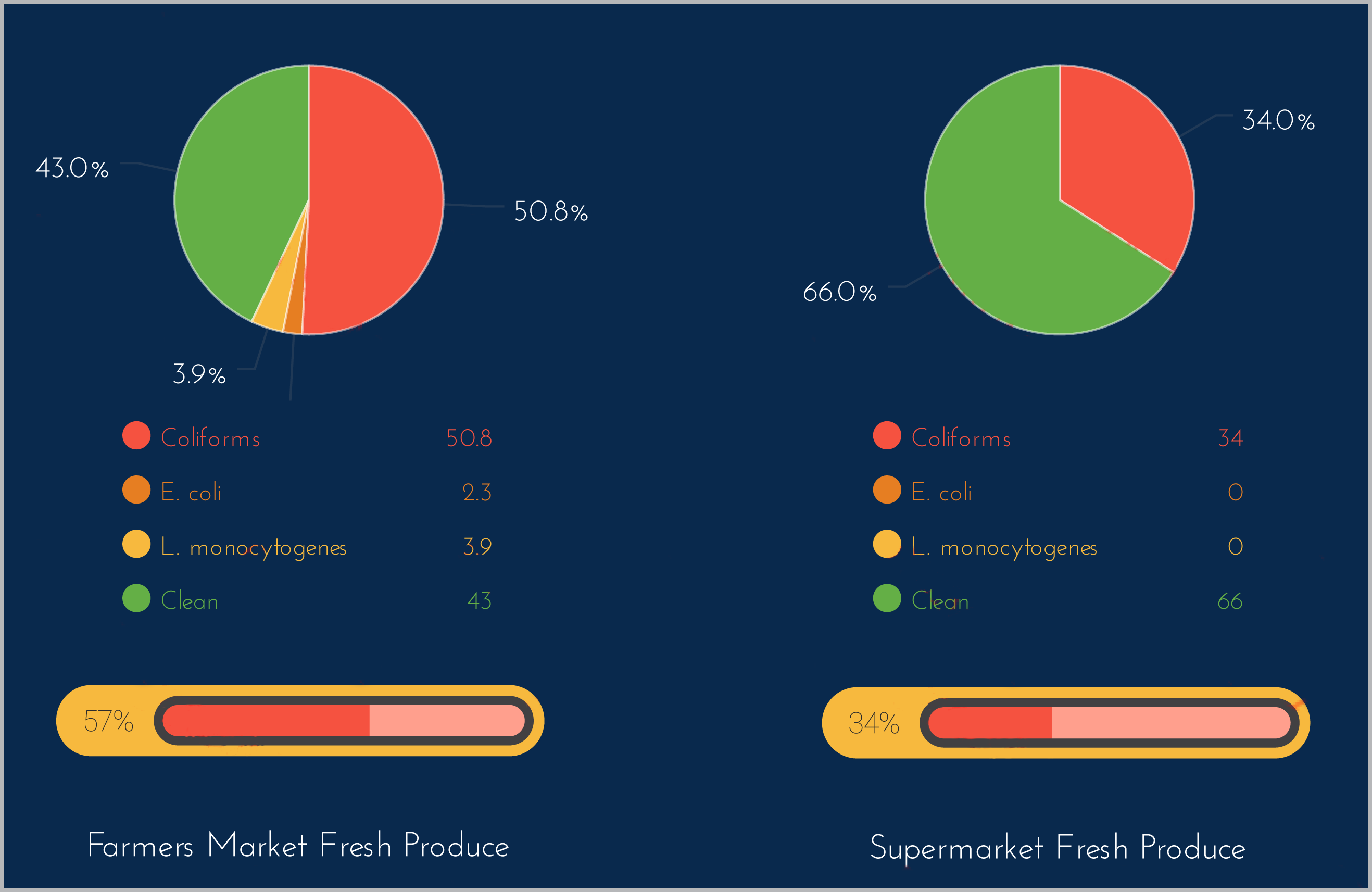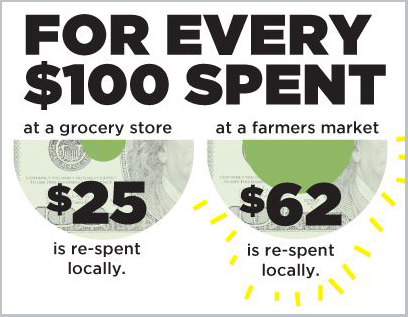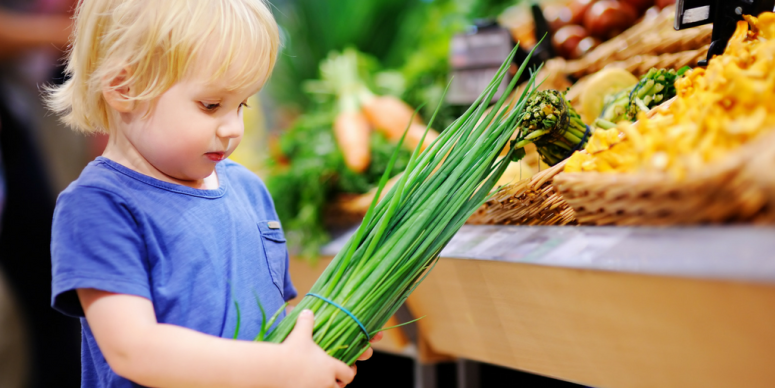A few days ago I was having an interesting conversation with one of my friend, Mike. Not his real name. We were talking about the rapid emergence of farmers’ markets and what it meant to small-scale farmers.
Mike and I are always passionate about things that affect our society every day. Most often we find ourselves jumping from one topic to another sharing our thoughts – Now on this occasion, Mike had a totally different idea of what a farmers market was.
To him a farmers market was another name for an exhibition where businesses displayed their latest products such as pesticides, fertilizers, farm machinery, and other farm related tech gadgets.
I know that Mike isn’t alone:
There are so many other versions out there of what a farmers market is? What products are traded? And who buys those products?
And those that do know the answers to the above questions are either misinformed or have wrong perceptions.
In today’s post, I’m going to reveal 17 undisputed facts about farmers markets that everyone should know – including you Mike 😉
Without any specific order, here are;
17 Facts about Farmers Markets: The Complete List
1. Food safety is a major issue
In a recent study about food safety in both farmers market and supermarket, findings show that despite many consumers believing that locally grown fruits and vegetables are completely safe, these statistics prove otherwise.

The data shows that the food samples taken from the farmers market had more levels of both coliforms and L. monocytogenes in comparison to the samples from the supermarket.
E. coli was prevalent in spinach by 5.8%, leafy greens by 2.6%, and tomatoes by 2.2% all present in the farmers’ market food products.
However, this does not mean that all farmers market have contamination issues. Well managed ones are very keen in training their vendors about food safety.
Therefore, this should not freak you out. You just need to know what to look for in a farmers market to know whether they are taking food safety issues seriously.
Sidenote: At AgrimarketAdvisor, we list handpicked market that will give you an exciting outdoor experience while ensuring your safety is guaranteed.
2. Commodity Prices
The perception that farmers markets are expensive is relative, not absolute. Given the value you get the price is just right.
Besides, the opposite is always true that prices are relatively lower at the farmers market because of the short distribution chain.
To put this debate into perspective, happy money saver – compared prices of 30 commodities from a grocery store and a farmers market.
16 of the items were cheaper at the grocery store while only 9 were cheaper at the farmers market. As for the rest of the items, I guess the price squared out.
3. Farmers markets benefit the environment
Climate change is a big threat to the planet as well as food security. Just last year, the global carbon dioxide emission rose to an all-time high.
While emissions from fossil fuel burning and industrial uses were most responsible, farming also plays a role. This may come as a surprise, but food is among your household’s largest sources of carbon dioxide equivalent emissions.
The majority of these emissions (83 percent) occur during the production of food, while food transportation accounts for approximately 11 percent.
It’s this 11% that should concern you:
Let’s face it; majority of food products sold at the supermarkets and other grocery stores comes from miles away. That’s why farmers markets are a better solution to this problem.
You can buy locally produced food from a farmers market instead.
Given that most of the carbon emission comes from food production rather than food transport, it may seem that buying local food doesn’t have a significant impact.
However, if you consumed only food that’s locally grown for an entire year, the impact would be quite substantial.
4. Farmers markets benefit the environment

Most farmers’ market produce is grown within 100 miles of the market.
These avenues are a unique incubator of small local businesses that allow for consumers to circulate money within their economy.
This means that the farms are a source of local jobs and likely to spend money they make on their produce in the local economy.
When you buy local, you support a local farmer who in turn support the local economy.
5. Tourist attractions
Most farmers markets have positioned themselves as tourist attraction venues. No wonder 5% of all farmers’ market visitors in specific cities are tourists – on average.
To get a feel of the cultures that exist in different parts of the world, visit the farmer’s markets.
When you do, you’ll get to know staple meals of other people, get an opportunity to try new foods, learn new things by interacting with different people and their way of life.
6. Variety of food stuff and other products
Items likely to be sold at a farmers market vary widely depending on the season and location. But generally, you’ll find commodities such as fruits, vegetables, flowers, jams, jellies, eggs, meat, relishes, salsa and many more.
You can read about more products here
With farmers market you are guaranteed of variety and more options to choose from. Actually this is the main reason why it’s a farmers market.
Otherwise, they’ll just be roadside stands!
7. Starting a farmers market is easy, running it is difficult
Correction – starting a farmers market in your area is relatively easy. However, some local governments can make it a pain in the butt.
But this is not the trickiest part.
Managing a market and making it successful for everyone is.
Trouble begins when you have to recruit and retain vendors while at the same time attracting enough customers to the market.
It’s a fact that you should know if you want to go that route.
8. Farmers markets offer part of the solution to “hidden hunger”
Hidden hunger, or micronutrient deficiencies, occurs when the quality of food that people eat does not meet their nutrient requirements, so they are not getting the essential vitamins and minerals they need for their growth and development.
It affects two billion people across the globe.
You can learn more about hidden hunger from FAO and WHO experts by watching this short video.
Fruits and vegetables from these outlets are rich in nutrients. The reason being – the time it takes from the farm to your plate is drastically reduced.
That means minimal nutritional loss and you get your produce fresh and busty with nutrients – yummy.
9. Farmers market inspires healthy eating habits
Beautiful displays and buzzing community encourages consumers especially the kids to eat more fruits and veggies as opposed to junk food.

Kids are not only exposed to new foods, they are encouraged to explore!
Start the day by helping kids color and decorate their own canvas bag to bring home treasures from a variety of vendors.
When children have their own bag, they have more opportunities to pick up the produce, exploring the texture and fresh aroma of cut herbs, corn husks and unusual offerings like bundles of purple asparagus.
Plus, they are more likely to ask questions about fruits and vegetables that are new to them, creating teachable moments about food and nutrition.
Allowing children to pick out what they would like to try gives them ownership in the process, which carries over into mealtime.
Read more on how farmers markets can help foster adventurous eating
10. Pets could be allowed
Some farmer’s markets are very strict with what you can bring with you. For example pets such as dogs and cats are prohibited in these kinds of markets.
But a majority of the farmers markets will actually allow you to visit with your pets with no restriction.
It’s important to check with your market whether they have any restrictions prior to your visit.
Once you know this, you can make an informed decision and save yourself the trouble of explaining why you brought your pet in the first place in otherwise restricted market.
11. Attend early in the morning or late in the evening
In the morning you get it fresh plus the full attention of the vendor. In the evening you get great discounts and sometimes free stuff.
Let me explain:
Markets tend to be less crowded right when they open or just before they close. There are many, many exceptions to this, so try going to your market at different times to figure out the best time for you.
For the best selection, go to the farmers market early.
The best goods go first:
Popular-but-limited items may even sell out before the day is done. It’s as simple as that.
For the best deals, go to the farmers market late. Farmers and other vendors sometimes discount products instead of loading them back up and schlepping them home.
Farmers raise this food for a living, however, so don’t expect or ask for deep discounts. Importantly, some markets have rules against end-of-the-day discounts.
Source: the spruce
12. You can taste before you buy
The interesting thing about farmers markets is that you can always taste the samples before you commit to buy.
This gives you an opportunity to taste drive different commodities before spending any money.
I’ve heard of scenarios where a consumer goes on a spending spree only to realize half of the stuffs bought were not necessary at all.
The finally result; filled bins and money down the drain.
Sidenote: Not all farmers’ markets are the same neither are the vendors. Therefore, it’s not ethical to go around demanding to taste before buying. It takes substantial resources to prepare those samples and some vendors just can’t afford to prepare them. Don’t hold it against them.
13. Local grown isn’t always grown locally
Over the recent past, some unethical food outlets have emerged claiming to sell organic local grown food products.
These vendors dupe the customers with local – organic narrative while in reality they are resellers of GMO’s and food brought from miles away.
Considering that some farmers markets around the world allow pretty much any vendor to set up in a given space – and, it’s true that while in most cases, they’re filled with clean, healthy, nutrient dense food, not everything is necessarily represented honestly.
You can find out whether you’re being duped by your local farmers markets here
14. Social event
You can bring your entire family to the market including your favorite pets.
In fact social interaction is one of the motivations for consumers to attend a farmers market. In this case, they don’t just buy products but an experience.
To back my claims, a study was done about understanding consumers and their motivations specifically in local markets.
The findings listed social interaction as a motivator.
But the findings went further in establishing that those attending for social
Interactions were more likely to be unmarried males or larger families attending events.
15. Vendors are masters of recycling
Most vendors have a good sense of how much will sell on any given market day, and prepare for it accordingly.
However, if there are leftovers at the end of market, vendors are ready to recycle unsold produce into value-added products.
For instance, excess tomatoes become tomato sauce and apples become apple cider. Unsaleable produce can be composted to return nutrients back to the farmers’ fields.
16. There’s a better chance that organic products are indeed organic
Let’s face it:
Some organic farmers are so by certification and not by practice.
Sadly, consumers like you and I have no way of telling this. The good news is that meeting the farmers directly offers you an opportunity to interrogate their processes.
Some go to an extent of organizing farm visits for the public.
This kind of arrangement ensures that there is less chance that vendors will sell non-organic food products as organic.
In addition, well-regulated markets have very stringent admission guidelines.
To safeguard the consumer, measures been have been put into place that any use of certificates or other fraudulent documents to market, label, or sell non-organic agricultural products as organic can result in a civil penalty of up to $11,000 per violation.
Which is not worth the trouble, you’ll agree.
Therefore, you can be sure that what you buy from a farmers market as organic could actually be organic!
17. It’s a multi-billion industry
Farmers’ markets are a multi-billion industry.
Farmers’ market coalition reports that more than 3 million consumers shop and more than 60,000 farmers sell at these markets annually.
This is in the United States alone. Globally, the figure should be much higher.
The United States Department of Agriculture estimates that these markets generate approximately $1 billion in consumer spending each year.
Conclusion
My goal for this article on the facts about farmers markets was to dispel misconstrued information and give a framework for better understanding of the subject.
I hope I have achieved that goal.
Be the judge and let me know your thoughts in the comments.



